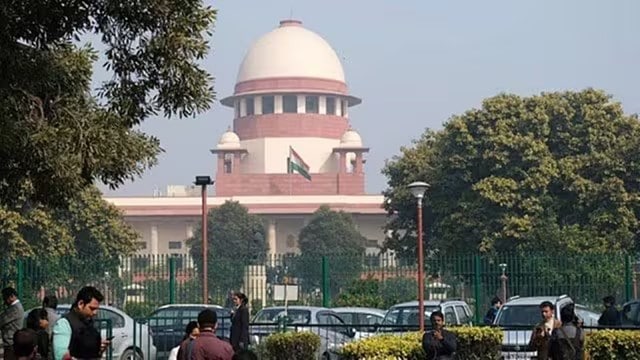While a husband certainly does not have a fundamental right to violate the consent of the wife, terming such a violation as “rape” is “excessively harsh and therefore, disproportionate,” the Centre on Thursday told the Supreme Court, spelling out its stand for the first time on marital rape exception in law.
“It is submitted that a husband certainly does not have any fundamental right to violate the consent of the wife, however, attracting the crime in the nature “rape” as recognised in India to the institution of marriage can be arguably considered to be excessively harsh and therefore, disproportionate. This Hon’ble Court has further adopted a balancing approach in order to reconcile in the perceivable engagement between fundamental rights,” the affidavit stated.

This is the first time that the government has on record opposed the striking down the marital rape exception. In 2022, before the Delhi High Court, the union government had said that the “issue needs wider consultations” and that a review of existing criminal laws was pending at that time.
“Insofar as UOI is concerned, Mr Tushar Mehta, learned Solicitor General stated before us in no uncertain terms that UOI does not wish to take a stand in the matter. In fact, affidavit(s) were filed to the effect that UOI would like to engage in consultation before moving further in the matter.” The two-judge bench of the HC had noted while delivering a split verdict. Justice Rajiv Shakdher, who was in favour of striking down the exception, had said that the arguments would have been “richer had Mr Mehta i.e., learned Solicitor General assisted the court in the matter.”
In a 49-page affidavit filed by the Ministry of Home Affairs, the Centre acknowledged marital rape as an act “ought to be illegal and criminalised.” However, its prescription for the crime was a refrain since the “consequences of such violations within marriage differ from those outside it.”
“It is submitted that the act colloquially referred to as ‘marital rape’ ought to be illegal and criminalised. The Central Government asserts that a woman’s consent is not obliterated by marriage, and its violation should result in penal consequences. However, the consequences of such violations within marriage differ from those outside it. Parliament has provided different remedies, including criminal law provisions, to protect consent within marriage. Sections 354, 354A, 354B, 498A IPC, and the Protection of Women from Domestic Violence Act, 2005, ensure serious penal consequences for such violations,” the affidavit stated.
The Centre’s response came in a batch of petitions challenging the marital rape exception in the penal code- now the Bharatiya Nyaya Sanhita. The law that defines rape- Section 63(2) of the BNS and Section 375 of the Indian Penal Code defines rape and lists seven notions of consent that, if vitiated, would constitute the offence of rape by a man. However, the provision contains a crucial exemption: “Sexual intercourse or sexual acts by a man with his own wife, the wife not being under eighteen years of age, is not rape.” This exemption essentially allows a marital right to a “husband”, who can with legal sanction exercise his right to consensual or non-consensual sex with his “wife”.
Story continues below this ad
In 2022, the Karnataka HC allowed trial against a husband for rape, holding that the marital rape exception was “age-old…regressive” concept. “A man is a man; an act is an act; rape is a rape, be it performed by a man the ‘husband’ on the woman ‘wife’,” the High Court had said. While this trial was stayed by the SC, the court accepted to hear a larger challenge against the marital rape exception. This case was subsequently clubbed with a batch of appeals that arose from the Delhi HC split verdict.
Non-consensual acts on a wife including forced sex already have penal consequences in Domestic Violence Act, 2005 and other provisions of the penal code. The Centre cited these provisions to argue that treating marital rape as rape “may severely impact the conjugal relationship and may lead to serious disturbances in the institution of marriage
The affidavit emphasised that a woman’s consent is the same whether she is married or not. However, ‘this one aspect” must be weighed against “other differentiating factors, and the element of overwhelming public interest in preserving the marital institution,” the government argued.
The affidavit cited Article 14 of the Constitution, the right to equality to argue that sexual violations in marital and non-marital spaces are two different “situations” and their treatment in law “as different and unequal” is entirely in sync with the mandate of Article 14.
Story continues below this ad
“Therefore…the consent of a woman stands protected even within the institution of marriage. The only distinguishing feature is the different consequences that flow in law in case such consent is violated within the institution of marriage and outside it…to declare that the Section 375/376 of IPC, to be applicable to the institution of marriage would result in unsettling the delicate balance and sensitivity of the issue at hand”, the Centre stated.
The Centre also argued the petitioners had the “misconception and the wrong notion” that marriage is “only a private institution”.
It said, “this understanding is incorrect as the marriage, in any societal setup, also entails numerous social and public aspects…regulation of the said institution of marriage, the codification of certain rights and obligations that are created by virtue of such institution being deeply rooted in the country/society, is the norm across jurisdictions.”
“In an institution of marriage, there exists a continuing expectation, by either of the spouses, to have reasonable sexual access from the other. Though these expectations do not entitle the husband to coerce or force his wife into sex, against her or his will. At the same time, it is submitted, these obligations, expectations and considerations, which are completely absent in the case of a stranger who seeks sexual congress, or even from any other intimate relationship, constitutes as a sufficient basis for the Legislature to distinguish qualitatively between an incident of non-consensual sex within the marital sphere and without it.”
Story continues below this ad
The affidavit also stated that among the 15 states that responded to the Centre’s query on whether the marital rape exception must be retained, only Karnataka, Tripura and Delhi opposed the provision while Assam, Chattisgarh, Goa, Uttar Pradesh, Gujarat, Madhya Pradesh, Manipur, Uttarakhand and Ladakh were in favour. Even the National Commission for Women was also in favour of retaining the marital rape exception.









